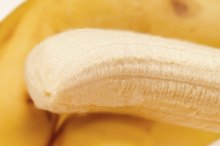How to Lower Potassium Levels
Potassium is an essential nutrient that's found in various foods. The body needs potassium. Yet, having a high potassium level is dangerous, and this condition can cause muscle weakness, impede kidney function and increase your risk of having a heart attack. However, there are quick and simple ways to lower your potassium level.
Increase your calcium intake. Calcium effectively lowers potassium levels. Include yogurt, milk and other dairy products into your diet. If necessary, take supplements to receive the daily recommended dose of calcium.
Does Potassium Aid in Weight Loss?
Learn More
Take garlic supplements. Other natural remedies to lower high potassium levels include eating a clove of garlic or taking garlic supplements each day.
Drink plenty of water. Water is an antioxidant, and it removes harmful toxins from the body. If you're trying to normalize your potassium level, increase your water intake. Drink between eight and ten glasses of water a day. Limit your intake of caffeinated beverages (soda, coffee and teas) and alcohol.
What Is the Potassium Content in a Banana?
Learn More
Eat plenty of fruits and vegetables. To lower your potassium level, you'll need to modify your diet and limit your intake of potassium-rich foods. These include potatoes, peas and bananas. Fruits and vegetables that help lower potassium levels include berries, canned peaches, lemon, cauliflower, lettuce, and cucumbers.
Exercise regularly. Frequent workouts can improve your overall health and lower your potassium level. Create an exercise schedule and workout for 30 minutes at least three times of week. Complete a combination of light exercises, aerobics and strength training.
Tips
Taking a diuretic can help the kidneys flush excess potassium from the bloodstream. Processed foods are generally low in potassium, whereas fresh fruits and vegetables tend to have higher potassium levels.
Warnings
Having a extremely low potassium level is just as dangerous as having a high potassium level. Both can result in heart failure and other complications. Thus, you shouldn't completely eliminate potassium-rich foods from your diet.
Related Articles
References
- Aburto, et. al. Effect of increased potassium intake on cardiovascular risk factors and disease: systematic review and meta-analyses. BMJ. 2013 Apr 3;346:f1378. DOI: 10.1136/bmj.f1378.
- Appel LJ, Moore TJ, Obarzanek E, et al. A clinical trial of the effects of dietary patterns on blood pressure. DASH Collaborative Research Group. N Engl J Med. 1997;336(16):1117-1124.
- Ferraro PM, et. al. Dietary Protein and Potassium, Diet–Dependent Net Acid Load, and Risk of Incident Kidney Stones. CJASN. October 2016, 11 (10) 1834-1844; DOI: 10.2215/CJN.01520216
- Granchi, D, et. al. Potassium Citrate Supplementation Decreases the Biochemical Markers of Bone Loss in a Group of Osteopenic Women: The Results of a Randomized, Double-Blind, Placebo-Controlled Pilot Study. Nutrients. 2018 Sep 12;10(9). pii: E1293. DOI: 10.3390/nu10091293.
- Linus Pauling Institute. Potassium.
- Macdonald, HM, et. al. Effect of potassium citrate supplementation or increased fruit and vegetable intake on bone metabolism in healthy postmenopausal women: a randomized controlled trial. Am J Clin Nutr. 2008 Aug;88(2):465-74.
- National Institute of Health. Office of Dietary Supplements. Potassium.
Tips
- Taking a diuretic can help the kidneys flush excess potassium from the bloodstream. Processed foods are generally low in potassium, whereas fresh fruits and vegetables tend to have higher potassium levels.
Warnings
- Having a extremely low potassium level is just as dangerous as having a high potassium level. Both can result in heart failure and other complications. Thus, you shouldn't completely eliminate potassium-rich foods from your diet.
Writer Bio
Valencia Higuera is a freelance writer from Chesapeake, Virginia. She has contributed content to print publications and online publications such as Sidestep.com, AOL Travel, Work.com and ABC Loan Guide. Higuera primarily works as a personal finance, travel and medical writer. She holds a Bachelor of Arts degree in English/journalism from Old Dominion University.









